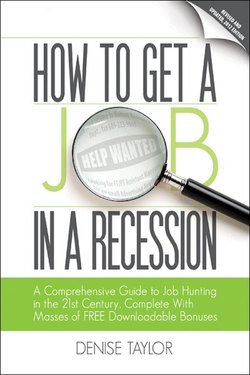Читать книгу How to Get a Job In a Recession: A Comprehensive Guide to Job Hunting In the 21st Century - Denise M.D. Taylor - Страница 9
На сайте Литреса книга снята с продажи.
Have you been unemployed for a long time?
ОглавлениеTime to review your approach. If your house wasn’t selling, you would probably take it off the market, and put it back on sale a few weeks later as a new property, with maybe some rooms repainted, decluttered and more ‘kerb appeal’. Better to remove your CV from the different job boards, go through the activities in this book and start afresh in a few weeks. Think about what else you can add to your CV; volunteer to do the work you seek for a voluntary organisation. Look to what short courses could enhance your skills etc.
Day 1: How are you feeling?
It can be quite scary looking for a new job, particularly if it’s a long time since you last looked for one or you have yet to get a first job.
Action: Take 5 minutes to make a note of how you are feeling right now.
You may have used words describing your concern over the future, and how you feel right now – angry, resentful, bitter etc. but also, whilst perhaps a bit concerned and unsure, you may be excited; this might be the prod you need to start working for yourself or to do something new.
Many of us are in jobs that we don’t really like – we find them boring, we have a boss who creates too many problems, we don’t feel we are paid enough for what we do. So, particularly if you have got a reasonable redundancy payout, this may give you the impetus to do something you actually want to do.
We can’t ignore our feelings and of course it’s ok to feel disappointed, concerned, etc. But to be successful in job search, we also need to set these feelings to one side, or they will keep popping up as we apply for jobs and at interview. Continuing to feel bitter about what’s happened won’t help us perform well, and an interviewer will pick up on negative feelings.
So aim to concentrate on the positive.
Action: List three things you are grateful for. You can then refer back to this when things appear difficult.
You may have included your family, your health, friendships and your ability to learn new things. These positive things will help you as you progress in your job search.
Practical steps
You also need to take practical actions. If you are not in work, you need to get on with relevant activities each day. This includes spending a minimum of 4 hours a day (on average) with effective job search activity. Other things you could do during the remainder of the day include voluntary work, exercise (could be a brisk walk each day) and developing your skills, such as learning to use Excel.
You may need a reason to get out of bed each day, and if you are feeling a bit low and despondent, having a preset schedule will be helpful.
Offering your skills to a voluntary organisation for one day a week can allow you to have meaning and structure to a day, work in a team environment, use and develop skills, and will be useful to include on your CV and to discuss at interview. You won’t have just sat back and waited for a job. You might make some useful contacts as well!
Richard told me about the transferable skills he gained from voluntary work with the Citizens Advice Bureau which he hadn’t anticipated, such as how to understand a situation and clarify problems in a quick and timely manner, control and direct meetings yet be courteous and emphatic, and how to deliver unpopular news.
If you are unemployed, register at the job centre – you can do this online or by phoning 0800 055 66 88. When you call you will need to have your National Insurance number, and details of your rent/mortgage payments, employment history and savings. They will arrange for you to meet with an advisor and let you know if you are entitled to any financial assistance or free training programmes.
Day 2: Getting organised – Read Chapter 2
Systems! You may love them or hate them, but for job search you are going to need to be organised. I love systems and have created all the forms you are likely to need including forms to help you plan your day; this chapter also covers setting up a personal support system, getting references and more.
You can access all the forms and much more from the website: www.howtogetajobinarecession.com
Day 3: What do you want to do? – Read Chapter 3
It’s not enough to want a new job. You need to be clear on the specific job you want so that you can market yourself properly. In today’s chapter you can complete various exercises to get you focused on who you are and what you ideally want to do. You’ll then do a reality check. It can help to come up with two jobs, your ideal and a job that will do in the short term, so you have money to pay the bills.
